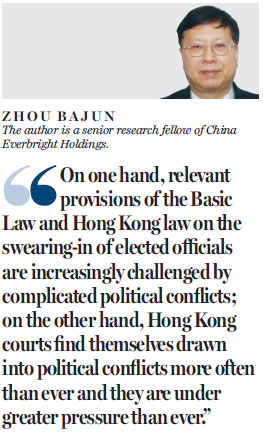Rule of law in the SAR must always follow the Basic Law
Updated: 2016-11-23 08:56
By Zhou Ba Jun(HK Edition)
|
|||||||||
The Court of First Instance (CFI) of the Hong Kong Special Administrative Region on Nov 15 delivered a ruling on a judicial review sought by the Chief Executive and secretary for justice. This challenged the effectiveness of the swearing-in of lawmakers-elect Leung Chung-hang and Yau Wai-ching. Soon afterward, on Nov 18, the same CFI judge accepted another judicial review case challenging a third lawmaker-elect's qualification as a Legislative Council member.
Also that day the CFI accepted a petition by "Hong Kong National Party" convener Chan Ho-tin to regain eligibility to run for public office in democratic elections. He was barred from the 2016 LegCo election because he refused to uphold the Basic Law. There are two more judicial review applications filed by Hong Kong citizens challenging the qualifications of multiple opposition politicians as LegCo members. This is because they all violated Article 104 of the Basic Law and Section 21 of the Oaths and Declarations Ordinance of the HKSAR, as Leung and Yau did.
It is unprecedented in the history of the HKSAR that so many judicial review cases have been filed at the same time over the same issue and the same judge has to hear and rule on all of them in succession. Particularly noteworthy is that the judicial review case on Leung and Yau's LegCo swearing-in was the first one pitting the CE against the LegCo president in court. It is safe to say that the pressure on the judiciary could not have been heavier in that case.

This is a new phenomenon in the deepening and intensifying political conflicts in Hong Kong. On one hand, relevant provisions of the Basic Law and Hong Kong law on the swearing-in of elected officials are increasingly challenged by complicated political conflicts; on the other hand, Hong Kong courts find themselves drawn into political conflicts more often than ever and they are under greater pressure than ever.
Some prominent figures in the judiciary have criticized in recent years the politicization of Hong Kong and the growing number of politically motivated judicial review cases. These cases have forced local courts to deal with matters that should be the responsibility of the executive and legislative branches of the government.
Take the judicial review cases triggered by the LegCo swearing-in scandals for example. Had the LegCo president followed Article 104 of the Basic Law and Section 21 of the Oaths and Declarations Ordinance exactly there would have been no need for any judicial review to decide the effectiveness of the swearing-in of Leung and Yau and possibly most of the other lawmakers who failed to take the LegCo oath faithfully. Take a step further back, and had the relevant office of the SAR government put adequate due diligence into screening the applications for joining the 2016 LegCo elections at least some of those swearing-in scandals would have been prevented.
To address the issue, government officials and leading pro-establishment figures must carry out their duties in strict accordance with the Basic Law and local laws. This is to prevent or at least ease the pressure on local courts from growing political conflicts.
There is no denying the opposition camp will abuse legal processes such as judicial review no matter how well government officials and important pro-establishment figures stick to the Basic Law and Hong Kong laws. As such, the opposition camp will find it hard to profit from judicial reviews as long as local courts do their part in safeguarding the correct implementation of the "One Country, Two Systems" principle in Hong Kong.
It should be noted that the CFI judge who heard and delivered the ruling on the judicial review of Leung and Yau's qualification as LegCo members made two very significant points in his decision. One is that the constitutional authority of the interpretation of Article 104 of the Basic Law by the Standing Committee of the National People's Congress (NPCSC) is undeniable and must be followed by Hong Kong courts at all levels; the other is that Section 21 of the Oaths and Declarations Ordinance is sufficient to reach a similar conclusion to the one consistent with Article 104 of the Basic Law. In other words, he did not need the NPCSC interpretation to reach his decision in this case.
However, if that is true, he should have granted the SAR government's request for a temporary injunction against the LegCo president's decision to allow Leung and Yau to retake the LegCo oath. This leads to yet another point of significance: Upholding the rule of law in the SAR must always follow the Basic Law.
(HK Edition 11/23/2016 page1)